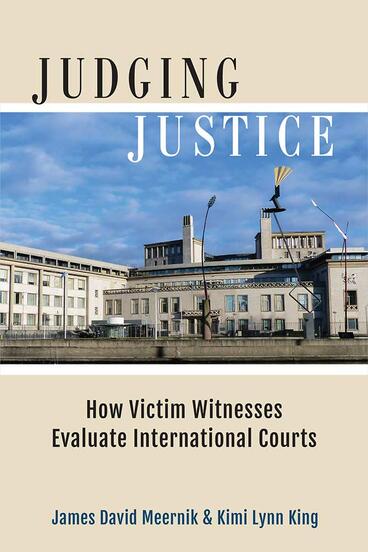Judging Justice
How Victim Witnesses Evaluate International Courts
Shows how witness experiences of testimony give credence to perceptions of justice in international courts
Description
Some injustices are so massive, so heinous, and so extraordinary that ordinary courts are no longer adequate. The creation of international courts and tribunals to confront major violations of human rights sought to bring justice to affected communities as well as to the entire world. Yet if justice is a righting of the imbalance between what has happened and what is reflected in the law, no amount of punishment and no judgment could compensate for that suffering and loss.
In order to understand the meaning of justice, James David Meernik and Kimi Lynn King studied the perspective of witnesses who have testified before the International Criminal Tribunal for the Former Yugoslavia (ICTY). Using a unique survey, Meernik and King look at the identity of the victims and their perception of the fairness of ICTY. Because of the need to justify the practical and emotional difficulties involved in testifying before an international tribunal, witnesses look not just to the institution to judge its effectiveness, but also to their own contribution, by testifying effectively. The central elements of the theory Meernik and King develop—identity, fairness, and experience—transcend specific conflicts and specific countries and are of importance to people everywhere.
James David Meernik is Regents Professor of Political Science and Director of the Castleberry Peace Institute at the University of North Texas.
Kimi Lynn King is Distinguished Teaching Professor of Political Science at the University of North Texas.
Reviews
“This book, based on a large empirical survey, substantially enriches our understanding of what matters most to individuals who testify in international war crimes trials. By illuminating the perspectives of ICTY witnesses, in particular their views about ‘justice,’ Meernik and King have made a major contribution to the scholarly literature on mechanisms for seeking truth and redress in the aftermath of mass atrocities.”
—Dr. Shanee Stepakoff, Psychologist, The Special Court for Sierra Leone
“Based on an extensive survey into witness experience with, and assessment of, the work of the ICTY, Meernik and King develop a theory of individual evaluations of international justice based on witness identity, experiences, and perceptions of fairness. Accessible and engrossing, Judging Justice is a must-read.”
—Matthew Weinert, University of Delaware
“The analysis of the data and of each hypothesis is detailed, nuanced, careful, thoughtful and persuasive. . . This book contributes to a richer understanding of the perceptions and experiences of victim/witnesses.”
—Alex Whiting, Harvard University

